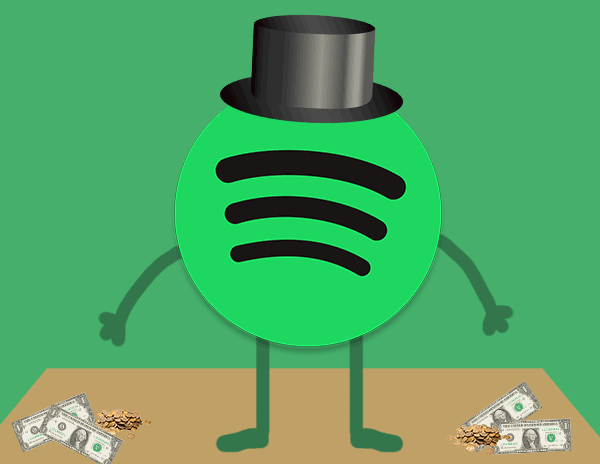Outrage sells. If you can’t get someone’s attention with sex, try making them angry. This tactic is as old as newspapers and it’s certainly not lost on big media platforms seeking to “create engagement”—a tech-speak phrase for what is simply mass emotional manipulation with the aim to boost online traffic. In 2021 whistles blew on Facebook/Instagram for the harm this type of “engagement” causes. Years back Myspace tanked because they failed to police cyber-bullying and toxic content (not to mention their computer-crashing virus-laden html code). Now Spotify’s in the hot seat with Joe Rogan’s controversial podcast—a flashpoint that compels us to ask how we define censorship and our right to protest and free speech.
People died so Americans could have free speech. We love it, promote it, brag about it even. Censorship is anathema to our culture. However, the right to free speech comes with responsibilities—to be maintained with care and wisdom. I can’t yell “fire” in a crowded theatre and call it “free speech.” Joe Rogan now admits he didn’t properly research the topics and the guests he’s brought on. Everyone makes poor choices but, if we’re being honest, jacking up controversy is a fast way to audience and revenue growth. He spilled milk on his way to the bank.
Then came the spilling of Rogan’s “Planet of the Apes” narrative, during which he said, “That sounds really racist.” In 2022 he got called out, apologized, then claimed he’s not a racist. In context with yet more disclosures of his misogynist subtexts and other dark sides in his back catalog (which Spotify is scrambling to remove), we’re watching Spotify wrap themselves in “free speech protection” when, in reality, they’re stuck with a loose cannon that’s costing them $100 million dollars.
By profession I’m a musician and recording artist, but I also hosted a radio show on NPR and I’ve been involved in music industry journalism since the 80s. As an avid student of media platforms, I can say with certainty that if I or anyone publicizes reckless or dangerous content, there will be a backlash! We lose endorsement deals, sponsors, followers, and/or even get terminated. When Whoppi Goldberg, Don Imus, Rush Limbaugh, Dan Rather, and Howard Stern made inglorious and poorly vetted comments, they took responsibility and suffered the consequences. Ditto for public officials and school teachers when they make career mis-steps. Everyone’s payday takes a hit when we screw up. Why is Joe Rogan so different?
In fairness to the anti-vaxxers that Rogan has given space to, they can fly the free speech flag, sell their books and services, and leg-up the legal standing of the “my body my business” crowd. I support that right. Conversely, factor in the historic pattern of pandemics, the preponderance of evidence that COVID vaccines work and are more safe than not, and the 270 medical professionals who lodged objections to Rogan’s platform. In this context the anti-vax argument like claiming a legal right to night-driving with no car headlights because they may be harmful to your eyes.
We all choose to be part of the problem or part of the solution. Neil Young’s solution was to exercise his free speech right to protest and pull his music off Spotify. Other creators and subscribers followed suit—again, within their rights. Being that Neil is famous, the focus shifted to distateful rants he made 30+ years ago, as if two wrongs make a right and Rogan’s off the hook. Some say old hippies have no business promoting censorship, but censorship is defined as “the suppression or prohibition of any parts of books, films, news, etc. that are considered obscene, politically unacceptable, or a threat to security.” Neil’s loud reaction is censure-ship, a denunciation or recommendation for us to stay away from people, places, and things that are objectionable. There should be no confusion between censorship and one’s right to object, protest, and act accordingly.
The Rogan-fracas is re-dredging Spotify’s other dramas: Their Borg-like market domination, Daniel Ek’s investment in a shadowy A.I. military firm, dissent at Spotify HQ, Ek’s antagonizing comebacks towards (or down at) the very musicians who feed his company, and the notorious .00348 cents per play to artists. Spotify has competitors who pay creators more or offset with more tech tools and support (example: Garth Brooks isn’t on Spotify because they couldn’t handle his physical merchandise). Months ago I noticed an uptick in media people and curators asking musicians to stop sending Spotify links, resisting the presumption that “everyone is on Spotify.” Fans are finding other high-fidelity streaming services (bandcamp, Napster, Soundcloud) and patronage sites (Patreon) to support the artists they love.
Ek and Rogan can still choose which side of history they want to fall on, to be part of the problem or part of the solution. The mindful exercise of free speech should not be lost in the noise of loose cannons.
#spotify #joerogan #danielek #freespeech #censorship #protest #royalties #neilyoung #jonimitchell #indiaarie #racism #mysoginy #planetoftheapges #whoppigoldberg #donimus #rushlimbaugh #danrather #howardstern #johnnyjblair #borg




